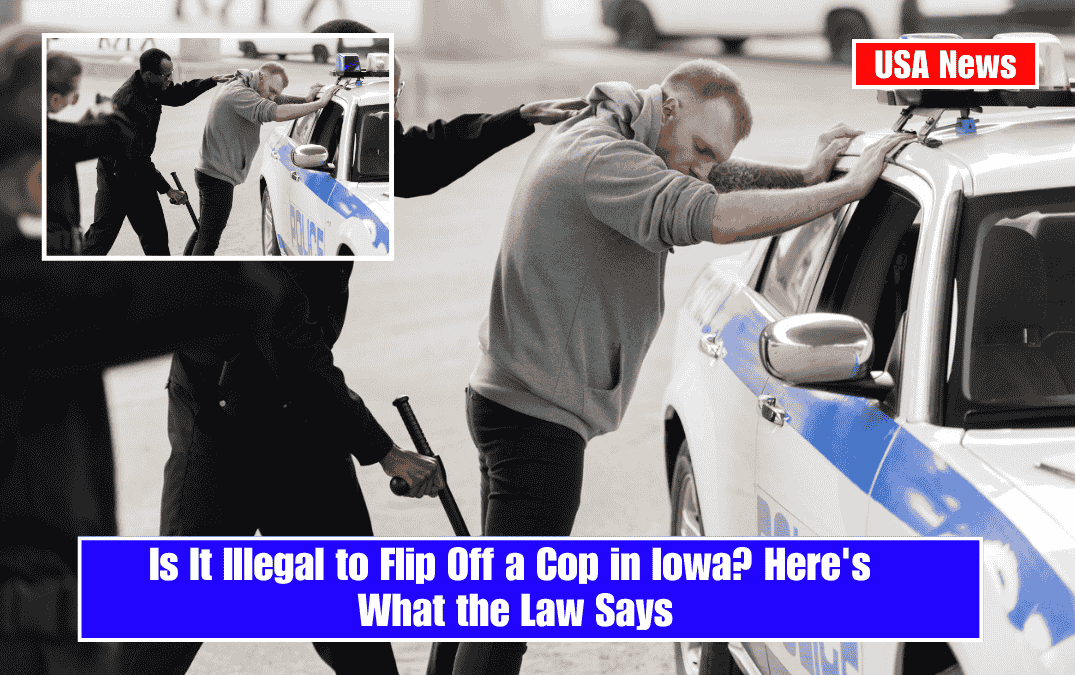Flipping off a police officer—commonly known as giving the middle finger—is a provocative gesture that often raises questions about legality and free speech. In Iowa, as in the rest of the United States, the answer is rooted in constitutional law and practical realities.
First Amendment Protection
The act of flipping off a police officer is generally protected under the First Amendment, which safeguards freedom of speech and expression. Legal experts and case law consistently affirm that, while the gesture is rude and disrespectful, it does not in itself constitute a crime in Iowa or elsewhere in the U.S. Courts have repeatedly ruled that non-threatening, offensive gestures directed at law enforcement fall under protected speech.
“According to Wirth Law Office, you do have the legal right, under the constitution and First Amendment free speech, to give a cop the middle finger. While the idea is a dumb one, it is legal to do so.”
Limits to Free Speech
However, First Amendment protection is not absolute. The law draws a line at speech or gestures that incite violence, constitute “fighting words,” or include threats. If the gesture is accompanied by verbal threats or actions that could provoke a violent response or disturb the peace, it may no longer be protected and could lead to criminal charges such as disorderly conduct or harassment.
“Speech that incites violence in another or in a crowd is not protected. Those are considered ‘fighting words’ and, as such, are not protected.”
Practical Consequences
While it is legal, flipping off a police officer can have real-world consequences. Officers may react by closely monitoring you, looking for any minor legal infractions to justify a stop or citation. Although such stops based solely on the gesture are unconstitutional, as courts have ruled, officers might still find other reasons to initiate contact or issue citations.
A notable example from Iowa involved officers arresting a man for a fictitious traffic violation after he flipped them off, though the original charge did not stand up in court. This illustrates that, while the gesture is legal, it can sometimes provoke unnecessary legal entanglements.
Case Law and Precedents
Federal courts have upheld the right to make offensive gestures toward police. In one widely cited case, a Michigan woman was pulled over and cited after flipping off an officer, but a federal appeals court ruled her gesture was protected by the First Amendment. Similar rulings have reinforced that police cannot lawfully detain or cite individuals solely for such gestures.
Summary Table: Flipping Off a Cop in Iowa
| Aspect | Legal Status in Iowa |
|---|---|
| Flipping off a cop | Legal, protected by First Amendment |
| If gesture is a threat | Not protected, may be illegal |
| If gesture incites violence | Not protected, may be illegal |
| Police retaliation | Unlawful if based solely on gesture |
| Practical consequences | Possible increased scrutiny or stops |
Flipping off a police officer in Iowa is not illegal and is generally protected as free speech under the First Amendment. However, if the gesture is accompanied by threats or incites violence, it may cross into criminal behavior.
While you cannot be lawfully arrested or cited solely for the gesture, doing so may attract unwanted attention from law enforcement, who could look for other infractions. In summary: it is legal, but not advisable.
SOURCES:-
[1] https://k923.fm/is-it-against-the-law-to-show-a-cop-the-middle-finger-in-iowa/
[2] https://www.avvo.com/legal-answers/is-it-illegal-for-me-to-flip-off-a-police-officer–1867110.html
[3] https://reason.com/2024/02/09/cops-arrested-him-for-a-fictitious-traffic-violation-because-he-flipped-them-off/
[4] https://www.police1.com/opinion/articles/what-can-a-cop-do-when-someone-flips-them-off-URa8cDBRuqZMkCLm/
[5] https://b100quadcities.com/its-actually-legal-to-flip-off-a-cop/









